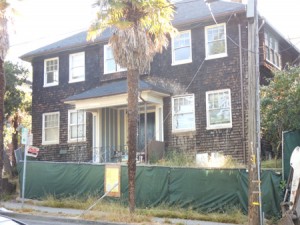CALL TO ACTION!

We at the Berkeley Tenants Union need your support on Tuesday, December 9 at the City Council meeting.
First, Council are considering a suggestion to tax the benefits of rent control on any long time tenant the government decides is earning a living wage. (Item 17)
Also, BTU members have appealed a dangerous decision by the Zoning Board which would set bad precedent and put over 4,000 units in Berkeley at risk. (Item 39)
Both items are expected to be near the beginning of the meeting, as early as 7:30 PM. Council meetings take place in Old City Hall, 2134 Martin Luther King Jr. Way.
2401 Warring Street Appeal by Harr and Stephens
This is the latest in a series of disputes BTU has fought at the Zoning Board – at the core is the interpretation of the Demolition Ordinance. In this case, a huge building on Warring near Channing has been under rent control for many years because it was used as a boarding house. Now, a new owner has removed all the renters and wants to turn it into a triplex. Rent Board staff and the owner appeared at the Zoning Board in the summertime. BTU was there as well. Everyone – even the owner Nathan George – seemed to agree that it was fair that one of the triplex units would be new construction because the owner is adding a lot of space, but that the other two units needed to stay under rent control.
Yet when the decision was written up by the staff from the Planning department, they chose to word the agreement in a way that would be legally unenforceable. This can get complex, but the gist of it is that Planning wants to give the building a new certificate of occupancy, and state law Costa Hawkins says a new COO means no rent control.
This is not what the Zoning Board intended. So BTU members Katherine Harr and Lisa Stephens filed an appeal.
Once again, the City Attorney is saying the units are empty and therefore not rent controlled units under the Demolition Ordinance. This means any building where the landlord can get the tenants out could easily be torn down with no mitigations for the loss of rent controlled housing.
The City is also saying that although Planning was aware that the building was a boarding house, it was not licensed to be one. This opens up over 4,000 units that have rent control but are not in Planning records as “permitted units” to lose rent control because they, too, could get a new certificate of occupancy.
Means Testing
Yes, you heard us right: the Housing Advisory Commission has asked Council to begin the process of means testing rent controlled tenants. Item 17 on the City Council agenda for Tuesday is the first step toward a plan by certain bitter property owners and the Council majority to tax middle income renters on their low rents.
“One approach we believe should be explored is to determine if some of the long term tenants in Berkeley’s rent controlled housing have been enjoying low rents while their incomes have been rising,” they wrote. There are many disturbing things about the proposal: the underlying assumption that rent control is a charity program and only the very poor deserve housing stability; the invasive nature of the proposal wherein longer term renters would be forced to disclose their income while owners do not have to do so; and the idea that measuring only income and rent would give the government any idea who can afford to pay more for housing, without considering medical bills, student tuition or student loans, number of dependents or other factors.
While BTU is pretty sure portions of the plan are actually illegal, and we expect the Rent Board will work to educate Council on that aspect, we need renters to stand together to show that local efforts to whittle away tenant protections and pit lower income folks against teachers, firefighters and small business owners making mid-range salaries will not be tolerated. Means testing would make Berkeley a city of just the very rich and very poor – just what rent stabilization was designed to prevent!
This type of proposal would never have been considered in the progressive Berkeley of the past and is clearly retaliation against tenants for supporting the “Robin Hood” ballot measures to tax owners of multiple rental units on their profits under vacancy decontrol.
JOIN US TUESDAY at CITY COUNCIL – items are early on the agenda
RSVP to info at berkeley tenants dot org to learn the plan!
Council Item 17
http://www.ci.berkeley.ca.us/Clerk/City_Council/2014/12_Dec/City_Council__12-09-2014_-_Regular_Meeting_Agenda.aspx
Council Item 23
http://www.ci.berkeley.ca.us/Clerk/City_Council/2014/12_Dec/City_Council__12-09-2014_-_Regular_Meeting_Agenda.aspx
